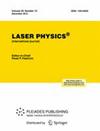Ultrafast nonlinear absorption in MoTe2 and MoTe2/MoS2 nanocomposite films and its application to all-optical logic gates
IF 1.1
4区 物理与天体物理
Q4 OPTICS
引用次数: 0
Abstract
Abstract We present a detailed theoretical analysis of ultrafast saturable absorption (SA) and reverse SA (RSA) in MoTe 2 nano-films with femtosecond (fs) laser pulses at 800 nm. A transition from RSA to SA occurs on increasing the thickness from 30 nm to 80 nm at a constant pump intensity of 141 GW cm −2 . On the other hand, a transition from SA to RSA occurs upon increasing the pump intensity in an 80 nm thick MoTe 2 nano-film. Theoretical results are in good agreement with reported experimental results. The effect of pump pulse intensity, pulse width, nonlinear absorption coefficient and sample thickness has been studied to optimize the SA ↔ RSA transition. The results for low-power and high contrast all-optical switching in MoTe 2 nano-films have been used to design all-optical fs NOT, OR, AND, as well as the universal all-optical NOR and NAND logic gates. The SA behavior of MoTe 2 /MoS 2 nanocomposite films has been used to design all-optical AND and OR logic gates. The nanocomposite films of MoTe 2 /MoS 2 possess a larger nonlinear optical response in comparison to MoTe 2 and MoS 2 nano-films and, therefore, all-optical logic gates designed using nanocomposite films result in a good switching contrast compared to pure MoTe 2 nano-films. Ultrafast operation at relatively low pump intensities demonstrates the applicability of MoTe 2 and MoTe 2 /MoS 2 nano-films for ultrafast all-optical information processing.MoTe2和MoTe2/MoS2纳米复合薄膜的超快非线性吸收及其在全光逻辑门中的应用
摘要本文用飞秒(fs)激光脉冲对MoTe 2纳米薄膜的超快饱和吸收(SA)和反向饱和吸收(RSA)进行了详细的理论分析。当泵浦强度为141 GW cm−2时,厚度从30 nm增加到80 nm,发生了从RSA到SA的转变。另一方面,在80 nm厚的MoTe 2纳米薄膜中,当泵浦强度增加时,会发生从SA到RSA的转变。理论结果与实验结果吻合较好。研究了泵浦脉冲强度、脉冲宽度、非线性吸收系数和样品厚度对SA↔RSA过渡的影响。在MoTe 2纳米薄膜中实现低功耗、高对比度全光开关的研究成果已被用于设计全光的NOT、OR、and,以及通用的全光NOR和NAND逻辑门。MoTe 2 /MoS 2纳米复合薄膜的SA特性已被用于设计全光与或逻辑门。与MoTe 2和MoS 2纳米薄膜相比,MoTe 2 /MoS 2纳米复合薄膜具有更大的非线性光学响应,因此,使用纳米复合薄膜设计的全光逻辑门与纯MoTe 2纳米薄膜相比具有良好的开关对比度。在相对较低的泵浦强度下的超快运行证明了MoTe 2和MoTe 2 /MoS 2纳米薄膜在超快全光信息处理中的适用性。
本文章由计算机程序翻译,如有差异,请以英文原文为准。
求助全文
约1分钟内获得全文
求助全文
来源期刊

Laser Physics
物理-光学
CiteScore
2.60
自引率
8.30%
发文量
127
审稿时长
2.2 months
期刊介绍:
Laser Physics offers a comprehensive view of theoretical and experimental laser research and applications. Articles cover every aspect of modern laser physics and quantum electronics, emphasizing physical effects in various media (solid, gaseous, liquid) leading to the generation of laser radiation; peculiarities of propagation of laser radiation; problems involving impact of laser radiation on various substances and the emerging physical effects, including coherent ones; the applied use of lasers and laser spectroscopy; the processing and storage of information; and more.
The full list of subject areas covered is as follows:
-physics of lasers-
fibre optics and fibre lasers-
quantum optics and quantum information science-
ultrafast optics and strong-field physics-
nonlinear optics-
physics of cold trapped atoms-
laser methods in chemistry, biology, medicine and ecology-
laser spectroscopy-
novel laser materials and lasers-
optics of nanomaterials-
interaction of laser radiation with matter-
laser interaction with solids-
photonics
 求助内容:
求助内容: 应助结果提醒方式:
应助结果提醒方式:


